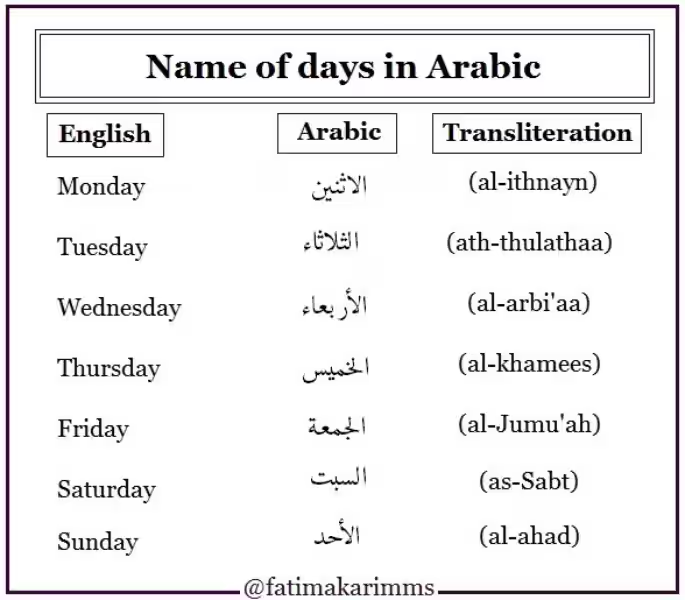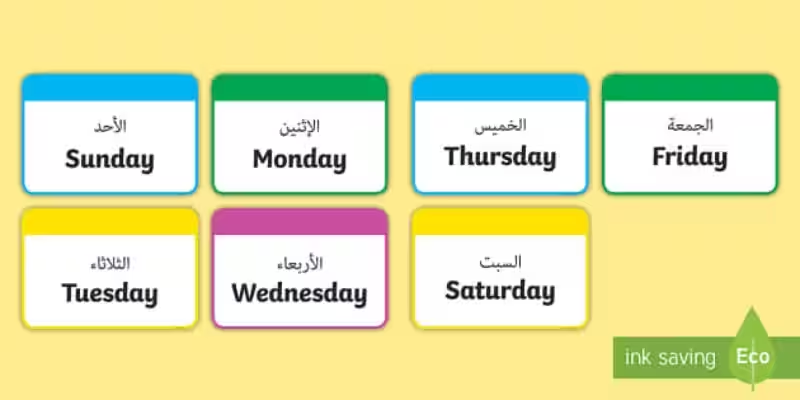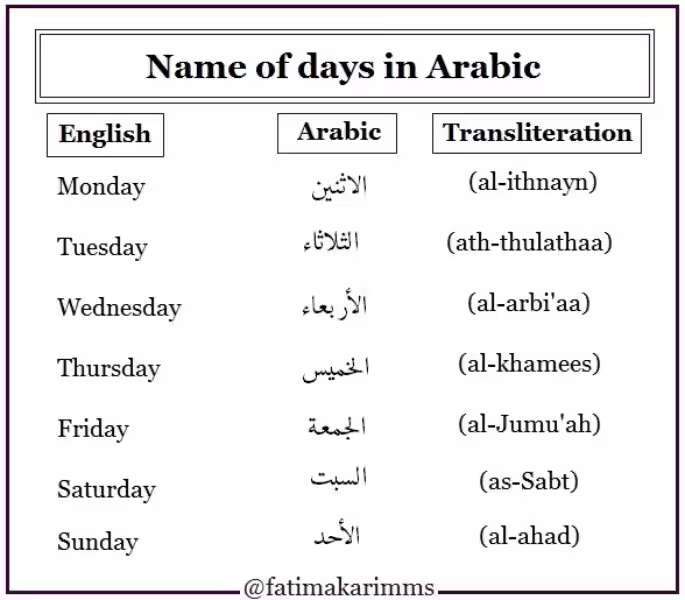
Learning the days of the week in Arabic is more than just memorizing words; it’s a gateway to understanding a rich culture and connecting with its people. This article delves into the intricacies of the Arabic week, exploring how these days are named, used, and their significance within Islamic tradition. Understanding the Arabic names for the days of the week opens up a new dimension to your interactions and understanding of the Arab world.
The Arabic Week: A Different Rhythm
The Arabic week, unlike the Western one beginning on Sunday, starts on Friday and ends on Thursday. This fundamental difference in the calendar structure is important to grasp. It reflects a different rhythm of life, profoundly shaped by cultural and religious practices. Understanding this shift in the start and end of the week is critical for planning social events, business meetings, and religious observances. It’s a subtle but important cultural distinction that can influence how various aspects of daily life flow. The way you schedule and plan will be significantly different when aware of this cultural difference.
This shift in the weekly cycle is deeply rooted in the cultural fabric of the Arab world. Understanding this difference is not only helpful but is also essential for productive and respectful interactions within the community. It influences scheduling, daily routines, and how people interact on a social and cultural level.
Unveiling the Names: A Linguistic Journey
The names given to the days of the week in Arabic are not arbitrary. Many are rooted in Arabic numerical systems, reflecting a clear mathematical order. This provides a helpful mnemonic device for learners. For example, the day after Friday (al-jumu’ah) is al-sabt (Saturday), which means “rest” or “cessation” of labor. This is directly related to the Islamic understanding of the day.
The seven fundamental days of the week in Arabic are named as follows:
- al-ahad (الْأَحَدُ): Sunday
- al-ithnayn (الإثْنَين): Monday
- al-thalatha (الثَّلاثاء): Tuesday
- al-arbi’a (الْأَرْبِعَاء): Wednesday
- al-khamis (الْخَمِيس): Thursday
- al-jumu’ah (الْجُمُعَة): Friday
- as-sabt (السبت): Saturday
These names are fundamental in daily life, business, and social interactions. Knowing these words allows one to participate more effectively in conversations and plan activities appropriately.
Pronunciation: Navigating the Sounds of Arabic
Correct pronunciation is key to effective communication. Arabic has sounds that may be unfamiliar to English speakers. Pay close attention to the glottal stop (a stop in the vocal chords) and various fricatives. Transliterations and phonetic guides are provided in resources like the one listed below. Practice these sounds, and you’ll find that pronunciation becomes less daunting.
Religious and Cultural Significance
Friday (al-jumu’ah) holds special significance in Islam as the day of congregational prayer. The word itself, jumu’ah, means “gathering” or “congregation.” This religious aspect influences daily schedules and social customs related to the day. Saturday (as-sabt) in Islam, like in many other cultures, is often associated with rest and reflection.
The other days of the week (al-ahad, al-ithnayn, etc.) take their names from the ordinal numbers in Arabic, aligning with a clear mathematical structure. This numerical connection can be a helpful tool for memorization.
Practical Application: Bringing the Language to Life
Memorization alone isn’t enough. Practical application through consistent use is vital. Here are some suggestions to make learning more engaging and effective:
- Flashcards: Create flashcards with the Arabic and English names for each day, and use digital options like Anki or Quizlet for spaced repetition.
- Arabic Songs: Children’s songs dedicated to the days of the week are excellent learning aids. These songs use the words in a fun and memorable context. Consider finding and listening to these songs, as it is a simple and enjoyable method of learning.
- Daily Practice: Incorporate the days of the week into your daily routine. For example, recite the days while looking at a calendar. This consistent practice reinforces memorization and makes the language more natural.
- Language Exchange: Engage with native Arabic speakers to practice pronunciation, gain cultural insights, and integrate the words into conversational contexts.
Understanding the days of the week in Arabic is a stepping stone to a deeper understanding of the culture. It allows you to participate more effectively in business and social situations. By understanding the cultural context and history of the names, you will find yourself better equipped to navigate and engage with the Arab world.
Beyond the Basics: A Deeper Dive
The days of the week in Arabic appear in various texts, including the Quran. The Quran references the six days of creation, illustrating the cultural and religious significance of these days. The Quranic references, combined with the understanding of the names’ roots, provide a more nuanced appreciation for the words’ significance.
This nuanced understanding of the days of the week is crucial for effective communication. It allows for more fluid and natural interactions, reflecting a deeper understanding of the cultural and linguistic context. This knowledge is fundamental for planning business meetings, coordinating social activities, and engaging in daily conversations. By acknowledging the subtle nuances and cultural context, you demonstrate respect for the culture and show the intention to engage in meaningful interactions.
In conclusion, mastering the days of the week in Arabic is not just about learning vocabulary; it’s about opening a window into a rich cultural heritage. By understanding the names, pronunciations, and cultural significance, you can better interact with the Arab world and appreciate the intricate tapestry of its traditions.
Arabic Days of the Week FAQ
This FAQ section addresses common questions about the Arabic days of the week, their origins, and usage.
What is the order of the days of the week in Arabic?
The Arabic week starts on Friday and ends on Thursday. This differs from the Western week, which begins on Sunday. The days are ordered numerically, with Friday being the first day, and Thursday being the last.
How are the days of the week named in Arabic?
The names of the days of the week in Arabic are primarily based on their numerical order within the week. Friday is “al-jumu’ah” (جمعة) which carries religious significance as the day of congregational prayer. Saturday is “as-sabt” (السبت), related to rest in ancient traditions. The remaining days are named using Arabic numerals:
- al-ahad (الأحد) – Sunday (meaning “the first”)
- al-ithnayn (الإثنين) – Monday (meaning “the second”)
- al-thalatha (الثلاثاء) – Tuesday (meaning “the third”)
- al-arbi’a (الأربعاء) – Wednesday (meaning “the fourth”)
- al-khamis (الخميس) – Thursday (meaning “the fifth”)
Why does the Arabic week start on Friday?
The Arabic week’s starting point on Friday is culturally and religiously significant. Friday is the Muslim day of congregational prayer, and it’s a day of rest and assembly, reflecting Islamic tradition.
How do I pronounce the days of the week correctly?
Proper pronunciation is crucial. This guide often includes phonetic transcriptions to help English speakers. Pay close attention to sounds like the glottal stop and various fricatives in Arabic. Resources like online pronunciation guides or native speakers can be helpful.
How can I remember the Arabic names for the days of the week?
Using flashcards, Arabic songs, and consistent repetition are effective memory aids. Digital flashcards (like Anki or Quizlet) can aid memorization through spaced repetition. Listening to children’s songs dedicated to the days of the week can also be engaging. Integrating the new vocabulary into your daily routine, such as reciting them while looking at a calendar, is also beneficial.
Can I use the days of the week in the past or future tense?
Yes, you can express the days of the week in the past and future tenses. For the past tense, use “al-maḍī” (الماضي) meaning “the last.” For the future, use “al-qādim” (القادم) meaning “the next.” For example: “al-jumu’ah al-maḍī” (the last Friday), “al-ahad al-qādim” (the next Sunday).
Are there different ways to say the days of the week?
While the names listed above are the standard Arabic forms, variations might exist depending on the region or dialect. For example, there could be different pronunciations or slight variations in the spellings. Learning the standard Arabic form is a good starting point.
How do the days of the week relate to Islam?
Friday (“al-jumu’ah”) is a crucial day in Islam, marked by congregational prayers. The Quran also references the six days of creation, highlighting the significance of the days of the week within Islamic tradition.
What are some practical applications of knowing the Arabic days of the week?
Knowing the Arabic days of the week is essential for navigating daily life in Arabic-speaking countries, including scheduling appointments, planning activities, and interacting with local businesses. Adjusting to the local week helps avoid misunderstandings in communication and scheduling.








